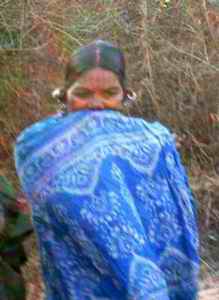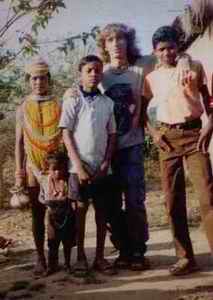WARNINGS AND ADVICE
Most of the trekking takes place in
areas totally without any kind of tourist structure; therefore,
 it is necessary to
have adaptability and a spirit of cooperation. There are also a few rules to
follow in trekking amongst the tribal population, in particular with the more
isolated groups.
it is necessary to
have adaptability and a spirit of cooperation. There are also a few rules to
follow in trekking amongst the tribal population, in particular with the more
isolated groups.
One needs a lot of discretion in the relationship with the tribal people, in particular with the many tribes where the refusal to be photographed is also due to magic reason and fear of sorcery. Often it is better to resist the impulse to take a snap of someone very interesting, for safety reasons, personal safety and group safety. For example, with the famous Bonda (but also the Kutia Khond and many other tribes), the risk of getting an arrow in the belly is very real, as a consequence of a little impoliteness or rudeness.
Obviously, after having been accepted as guests in a village and being better known reciprocally, it may be possible to take some photographs, after asking for permission to do so. In contrast, in some villages someone will ask spontaneously to be photographed, just for curiosity, certainly not for money.
 Be careful not to include a business
transaction with the tribal people and especially no gifts, even to children. In
the trekking fee, it is already considered that money will be given to the
family or village if we sleep in one of their huts, or for buying any supplies
or for their collaboration or help with any other service. In the relationship
with the tribes, outside this expenditure, there must be no other kind of
business.
Be careful not to include a business
transaction with the tribal people and especially no gifts, even to children. In
the trekking fee, it is already considered that money will be given to the
family or village if we sleep in one of their huts, or for buying any supplies
or for their collaboration or help with any other service. In the relationship
with the tribes, outside this expenditure, there must be no other kind of
business.
Inside the villages, we must also try to minimize our presence and to behave with tact and kindness. (In some villages, it is better to avoid touching objects, houses or people, because sometimes there are unthinkable taboos).
Concerning the trek inside Natural Park and Natural Sanctuary, the most important thing to consider is safety; this means faithfully following our instructions. Inside the Parks, we have to adapt our rhythm to the life of the animals and this means sometimes to sacrifice a few comforts.
We cannot hope for a vision of an African savannah with thousands of animals all around us. On the contrary the Indian jungles (as any other jungle!), gives at the first impact a feeling of lack of life, especially during some hours in the day. There are animals, but only with experience, the knowledge of their habitat, minimizing our presence and especially a lot of patience will it be possible to sight them.
The advisable clothes are with colors that harmonize with the jungle's colors (absolutely best to avoid white!); and of course it is necessary to limit shouts, sounds etc.
Whoever can adapt to this, will do wonderful trekking, while for those who feel they cannot accept these conditions, it would be better for them to go with some other agency.